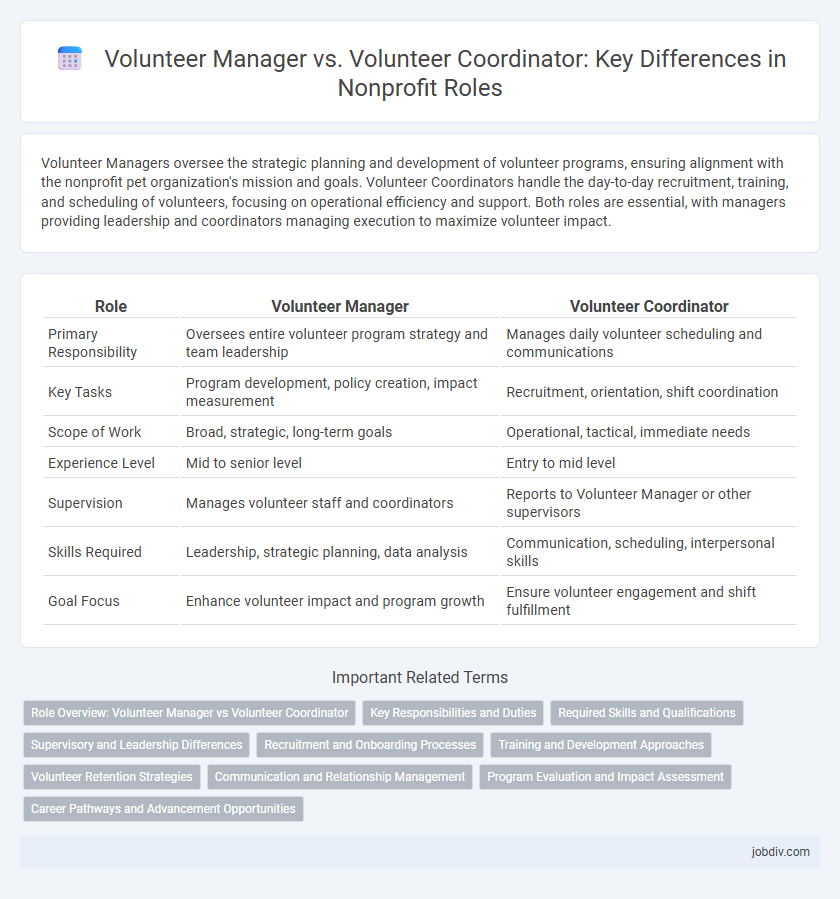Volunteer Managers oversee the strategic planning and development of volunteer programs, ensuring alignment with the nonprofit pet organization's mission and goals. Volunteer Coordinators handle the day-to-day recruitment, training, and scheduling of volunteers, focusing on operational efficiency and support. Both roles are essential, with managers providing leadership and coordinators managing execution to maximize volunteer impact.
Table of Comparison
| Role | Volunteer Manager | Volunteer Coordinator |
|---|---|---|
| Primary Responsibility | Oversees entire volunteer program strategy and team leadership | Manages daily volunteer scheduling and communications |
| Key Tasks | Program development, policy creation, impact measurement | Recruitment, orientation, shift coordination |
| Scope of Work | Broad, strategic, long-term goals | Operational, tactical, immediate needs |
| Experience Level | Mid to senior level | Entry to mid level |
| Supervision | Manages volunteer staff and coordinators | Reports to Volunteer Manager or other supervisors |
| Skills Required | Leadership, strategic planning, data analysis | Communication, scheduling, interpersonal skills |
| Goal Focus | Enhance volunteer impact and program growth | Ensure volunteer engagement and shift fulfillment |
Role Overview: Volunteer Manager vs Volunteer Coordinator
Volunteer Managers oversee the strategic development, recruitment, and retention of volunteers, ensuring alignment with the nonprofit's mission and long-term goals. Volunteer Coordinators handle day-to-day volunteer scheduling, training, and communication, managing immediate operational needs and volunteer engagement. Both roles are essential, with managers focusing on leadership and program growth, while coordinators emphasize execution and support.
Key Responsibilities and Duties
Volunteer Managers oversee the recruitment, training, and retention of volunteers, ensuring alignment with organizational goals and handling evaluation and conflict resolution. Volunteer Coordinators primarily focus on scheduling, communication, and day-to-day support of volunteers, facilitating volunteer engagement and task assignments. Both roles are essential for effective volunteer program management but differ in scope and leadership responsibilities.
Required Skills and Qualifications
Volunteer Managers require advanced leadership skills, including strategic planning, team management, and performance evaluation, often supported by a bachelor's degree in nonprofit management or a related field. Volunteer Coordinators need strong organizational abilities, communication skills, and experience with volunteer recruitment and scheduling, typically holding a certificate or associate degree in volunteer services or human resources. Both roles demand interpersonal skills, database management proficiency, and a commitment to community engagement, but Volunteer Managers oversee program development while Coordinators focus on day-to-day volunteer operations.
Supervisory and Leadership Differences
Volunteer managers typically oversee overall program development, strategic planning, and team leadership, ensuring volunteers are effectively guided and motivated. Volunteer coordinators often focus on day-to-day operations, including scheduling, training, and direct volunteer support with limited supervisory responsibilities. The primary leadership difference lies in the manager's role in setting vision and managing staff, while coordinators handle execution and immediate volunteer engagement.
Recruitment and Onboarding Processes
Volunteer Managers oversee the entire recruitment strategy, developing targeted campaigns and partnerships to attract diverse candidates, while Volunteer Coordinators handle day-to-day applicant screening and scheduling. In onboarding, Volunteer Managers design comprehensive training programs and set engagement goals, whereas Volunteer Coordinators facilitate orientation sessions and ensure compliance with organizational policies. Effective collaboration between both roles enhances volunteer retention and maximizes nonprofit impact.
Training and Development Approaches
Volunteer Managers implement strategic training programs tailored to enhance leadership skills and volunteer retention, often utilizing data-driven evaluations to refine development approaches. Volunteer Coordinators focus on onboarding and day-to-day volunteer guidance, emphasizing practical skill-building and immediate task readiness through hands-on training sessions. Both roles prioritize continuous learning but differ in scope, with Managers adopting a holistic development strategy and Coordinators addressing operational proficiency.
Volunteer Retention Strategies
Volunteer managers develop comprehensive volunteer retention strategies by fostering strong relationships, providing ongoing training, and recognizing contribution impact. Volunteer coordinators implement day-to-day engagement tactics such as scheduling, communication, and feedback collection to maintain volunteer motivation. Effective retention combines strategic oversight with operational support to sustain long-term volunteer commitment in nonprofit organizations.
Communication and Relationship Management
Volunteer Managers oversee strategic communication and foster long-term relationships with volunteers, ensuring alignment with nonprofit goals and sustaining engagement. Volunteer Coordinators handle day-to-day communication, providing clear instructions and support to volunteers during specific projects or events. Both roles require strong interpersonal skills, but Volunteer Managers emphasize relationship management at a higher organizational level.
Program Evaluation and Impact Assessment
Volunteer Managers oversee program evaluation by setting clear goals and tracking volunteer outcomes to measure impact accurately. Volunteer Coordinators collect data and facilitate feedback loops from volunteers, enabling continuous improvement in project delivery. Both roles collaborate to use qualitative and quantitative metrics for comprehensive impact assessment in nonprofit programs.
Career Pathways and Advancement Opportunities
Volunteer Managers typically oversee the entire volunteer program, leading strategic planning and team management, which positions them for senior leadership roles within nonprofit organizations. Volunteer Coordinators usually handle daily volunteer logistics and recruitment, providing foundational experience that can lead to advancement as Volunteer Managers. Career pathways often progress from Volunteer Coordinator to Volunteer Manager, with growth opportunities expanding into program director or nonprofit administration roles.
Volunteer Manager vs Volunteer Coordinator Infographic

 jobdiv.com
jobdiv.com